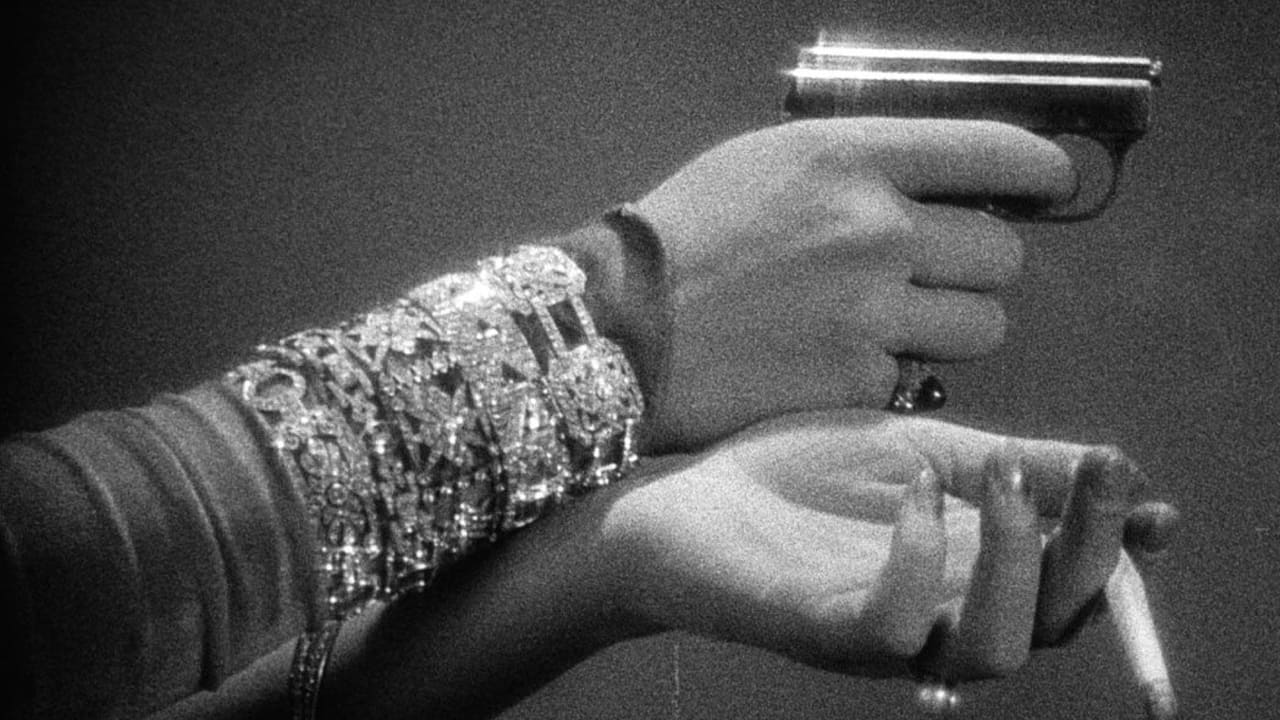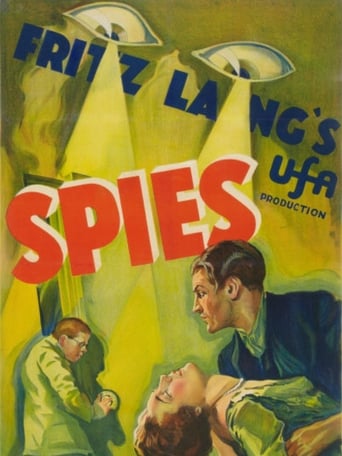



A Disappointing Continuation
I think this is a new genre that they're all sort of working their way through it and haven't got all the kinks worked out yet but it's a genre that works for me.
View More.Like the great film, it's made with a great deal of visible affection both in front of and behind the camera.
View MoreIt's simply great fun, a winsome film and an occasionally over-the-top luxury fantasy that never flags.
View MoreFritz Lang is one of my favorite directors and ''Metropolis'' is my favorite film. I love ''Woman in the Moon'', ''M'', and ''The Testament of Dr. Mabuse''. ''Spies'', sadly, is incredibly average. Don't get me wrong, this film has great moments. The opening is thrilling. The train scene is suspenseful. And the last 10 minutes are really good. Everything in between is uninteresting and drawn out. I got bored a lot (this is coming from somebody who loves 2001: A Space Odyssey) and found myself looking at the time displeased. I usually despise when studios cut films (Metropolis), but Paramount was smart in cutting this from 130 minutes to 90 minutes. I got the pleasure of seeing an original Paramount copy at the Denver Silent Film Festival and found myself enjoying Spies much more. In conclusion, ''Spies'' has some standout sequences, but is a major step down from ''Metropolis''
View More"Spione" or "Spies" is another Fritz Lang silent film from over 85 years ago. It is of course as always with him still in black-and-white and runs for no less than 145 minutes. At least, this applies to the version I watched. Maybe yours is different as there are, as always with these old films, many different versions out there, most of them restored. The cast includes several fairly famous actors from other pretty well-known silent film classics, such as Rudolf Klein-Rogge. The novel here came from Lang's longtime companion Thea von Harbou and the 2 also came up with the script. But only Lang directed as always.I must say I was a bit disappointed with this one. It has a couple good moments, but the material is not as good in quality to justify a quantity of almost 150 minutes. I like good spy movies, especially tense ones, but I cannot say this is one of them. Maybe it would have been at 100 minutes max. In any case, it would have been a lot better than this one here. I have seen several films of Lang and while I would not say it is his worst, it is also nowhere near his best. There are several sequences that drag a lot. As a result of all this, I cannot recommend the watch. Disappointing experience. Thumbs down.
View MoreSPIES is a German thriller from director Fritz Lang. Low budget black & white silent with subtitles; only later drawing any appreciation. Lang co-scrips with his then-wife Thea Von Harbou. A very good plot involving Russian espionage and assassination in London, with a subplot concerning Japanese loyalties. Rudolf Klein-Rogge plays Haghi, the wheelchair-bound mastermind of Russian spies,that hides his true identity by playing a sideshow clown. His dirty dealing comes from a secret room in his own financial building. Haghi has trouble with a defecting spy Sonya(Gerda Maurus), who may be pulling a double-cross in protecting a good guy, Agent 326(Willy Fritsch), from harms way.Suspense builds to an unexpected climax. Very little actual special effects, no fade-outs and plenty of close-ups vacillating scene to scene. Other players: Lien Deyers, Fritz Rasp, Hertha Von Walther and Lupu Pick.
View MoreFritz Lang is not a writer or director prone to following narrative conventions too closely. While that is admirable artistically, it can make his films relatively difficult viewing and risky. It's difficult because you can't expect Lang's films to have stories that unfold in a traditional way, so as a viewer, you have to work harder, and it's risky because the experimental nature doesn't always result in a successful finished artwork. Metropolis (1927) and Fury (1936) are two examples of Lang films with unusual approaches that work extremely well. M (1931) is an example of one that isn't quite so successful in my opinion, even though many people seem to love it. Spies is somewhere in the middle.Like M, Spies begins with more of a thematic collage. We're immediately dropped into a fast-paced, fast-cut sequence of spies stealing important documents and killing others when expedient. We also see news of this quickly filtering through both the spy world and the official media organizations. The sequence is impressive technically, but most viewers will be searching for the characters to latch onto. Also like M, Lang doesn't let viewers off that easily. He constantly introduces new characters for at least the first 40 minutes (of the 90-minute U.S. version). A number of the characters look similar, and most do not have much accompanying exposition to help viewers ground them. Making it more difficult, inter titles (this is a silent film) where characters' names are first presented often appear between two scenes with different characters, so that it's difficult to figure out which character the inter title is supposed to apply to.Additionally, the story is complex enough and hinges on small details to an extent where it can be difficult to follow on a first viewing. I had to watch the film twice to feel confident that I had a grasp on the plot. By the end of the first viewing, you know who the principle characters are, so on the second viewing you can focus more on them rather than the countless ancillary characters who keep appearing and disappearing.It might be difficult to count this as a flaw. There's no reason that films should be 100% accessible on a first viewing, and in fact, if you're someone who likes to watch a film more than once, a gradual unfolding on repeated exposures can be more desirable. But it's best to be forewarned. Expect to be confused unless you keep a scorecard, so to speak, and keep hitting pause.However, once you've sorted the film out, the basic gist turns out to be fairly simple and straightforward. An anti-government (the exact government isn't specified--it's rather left intentionally vague, except that we know it's somewhere in Europe) spy organization, headed by a man named Haghi (Rudolf Klein-Rogge), is after some important treaty. There are three copies of it, and Haghi is trying to intercept them all. Haghi's principle foe is the government's Secret Service Agency, which ends up putting a James Bond-like agent named 326, or Donald Tremaine (Willy Fritsch), on the case. Haghi sends his agent Sonia (Gerda Maurus) to gain information, and hopefully the treaty, from Tremaine. He also enlists the help of a convict whom he helped bust out of death row, Hans Morrier (Louis Ralph). Complications arise when Sonia and Donald fall in love. Haghi tries to get at another Secret Service affiliate, Doctor Masimoto (Lupu Pick) through another attractive female spy, Kitty (Lien Deyers). There is a lot of double crossing, and there are a lot of spy versus spy machinations. The film focuses on these and the difficult romance, as Haghi does the typical megalomaniacal "evil genius" thing of trying to take over the world (although just how he plans to do this with a treaty and his odd combination of public vocations remains a mystery).Lang is often thought of as a heavily visual director. In conjunction with infamous cinematographer Fritz Arno Wagner, who lensed such masterpieces as F. W. Murnau's Nosferatu (1922), Lang doesn't disappoint on that end. There are a number of conspicuously "arty" shots, such as a complex of staircases in Haghi's bank, Cabinet of Dr. Caligari (1920)-like rooftops, or the marvelously fantastical imagery of the final clown performance (you have to see the film to understand why there's a clown in it), but Lang and Wagner are just as good with more subtle compositions.But there are flaws, too. Even viewing the film a couple times, the overly complex details of the plot can be hard to follow and many are left as dangling threads. The overall gist of the plot is good, and Spies certainly has influenced subsequent films in the genre, but there are script problems here.Although Lang is good at creating suspense when he wants to (for most of M, he didn't seem interested in it), and he does do effectively quite a few times here, he still directs and edits action scenes a bit awkwardly. Also, the U.S. 90-minute version is satisfactorily paced, which helps the suspense, but it is also obviously sped up. The film was shot at 16 frames per minute and IMDb lists the "original" version at almost twice as long. If Spies were slowed down to run close to 3 hours, the pacing would be off. The plot would unfold too slowly.For me, this is a middling silent film, as well as a middling Lang film, thus earning my 7 rating, or a "C", but worth watching for serious fans of thrillers, crime and espionage flicks. As always, Lang is a good "ideas" man, and this film can make you feel as if the whole world must consist of spies, or at least people whom you can't exactly trust.
View More